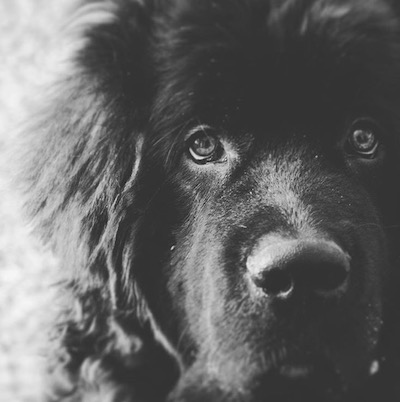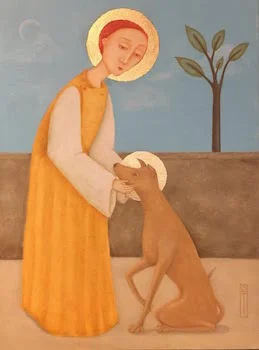Lessons from Dogs
“But ask the animals, and they will teach you . . . ”
—Job 12:7
I never planned on becoming a dog person.
And you know what I mean by “dog person.”
Because you’ve seen them wearing their puppies in organic cotton baby carriers and arranging doggie play dates and going to the dog park with satchels of locally sourced liver treats.
“Hmmm. I’m sorry, farm to dog bowl is so 2014. Santiago only eats free-range buffalo that he catches himself.”
But I dare you to bring home a fat, fluffy puppy that looks like an actual bear cub and not go a little Parker Posey.
Something happened in the moment that we brought our first pup into our home—a big, fluffy, wriggly Newfoundland dog. I tried not to attach in the beginning. Just in case. But by the time Sirius was three months old, he had his own place in my heart—and his own Instagram account.
My tween girls and I would watch sad dog movies and weep. Pet the dog. Watch another. Weep. At the end of Marley and Me, my husband looked over at me and I buried my face in my sweatshirt and sobbed, “DON’T LOOK AT ME!” I crawled onto the floor and rubbed Sirius’s belly as he gazed back into my eyes.
The training classes we took bonded us in a way I didn’t really understand before I had a dog. He would look up at my face, waiting for me to give a command, wanting to do the right thing at just the right moment. And I would throw my arms around him and squeal when he would get something right after so much practice—both of us working together and trying so hard.
Of course, it wasn’t all rosy. There were potty accidents, fingers bitten with sharp puppy teeth, and the baseboards in our hallway definitely took a beating (or a chewing, rather), but we put the hard work in, hoping and believing we’d have a healthy and well-trained dog after our efforts.
Just a few months into our journey, however, we experienced our first big hiccup—a limp that wouldn’t subside. And just weeks later, we received the devastating news that our puppy had severe and crippling malformations in all four of his legs. The pain could possibly be managed, but the issues were likely permanent.
And soon after his physical diagnosis came his first aggressive outburst.
We treated his physical ailments with therapies, supplements, and surgery. We followed up with medication, swimming, and physical therapy. We treated his mental illness with medication, herbs, positive training, and mental stimulation. He had a team of veterinarians, surgeons, physical therapists, trainers, and finally, a behaviorist.
After several months, he could no longer walk without pain and his aggression escalated. He was living in a world of pain and fear, and every day we could see our sweet boy slipping from us, along with all the hopes of the dog we had imagined he would become.
We had spent time and money and abundant love on our puppy. But when he had more bad days than good, when the light began to fade from his eyes, we made the impossible decision to give him one last thing. The hardest thing. We decided to let him go and set him free from his suffering.
Oddly, at the time, I was deep in work for a conservation organization developing “Creation Care” curriculum. A question proposed by a colleague had been on my mind: “How might I bless creation?”
How might I bless creation?
I want to save the bees! The forests! The rivers! I want to do something big and meaningful and lasting and sexy. That’s how I want to bless creation.
"Affinity" by Debbie Taylor
But a wise friend once told me that there is always some element of sacrifice involved to help something or someone else flourish. And in those painful moments reckoning what was happening with the dog that we loved, I realized that blessing creation, both human and non-human alike, might not be what you expect and usually comes at a cost.
Sirius wasn’t afraid of death. We would be the ones with broken hearts—maybe even forever. But we would take on that pain so that he could be whole again.
The day before he left us, we took him swimming one last time. We bought him treats and ice cream and a brand new stuffed toy. I bought him pillows from Goodwill to destroy since that’s all he ever wanted to do with the pillows on our bed.
I sat with him all day long in the backyard, just the two of us. I thought about the last year and all the work we had put into this dog. Just a dog. But even through my anger and sadness, I knew it was more than that. That every good thing we put into him had to mean something.
And so we let him go in our backyard, whispering into his ear the whole time that he was a good dog and that we loved him so much.
Losing him was devastating, but the response from our community afterward was overwhelming. Over and over I would say, “I don’t know why I’m crying so much—I know he was just a dog,” but everyone just shook their heads at the apology. Grown men and women—some I wouldn’t have expected—shared story after story about the dogs they had lost, speaking each name and how deeply they were affected.
The stories always had the same themes.
“I never knew I would love a dog so much.”
“My dog brings me so much joy.”
And I started to think that maybe I wasn’t that over-the-top. Maybe the elation of carrying a fluffy puppy home, the grief we felt when he was gone, and all the in-betweens were just our purest, most honest, God-created expressions.
Like when I’d watch my somewhat cynical curmudgeon of a husband scratch our puppy’s belly and let him lick his face in return. Or when I, usually stoic in the face of tragedy, cried in my friend’s arms after Sirius’s death.
Maybe that is how we are supposed to feel, as humans, instead of suppressing our joy and our lament.
Especially our lament.
St. Irenaeus once said, “The glory of God is man fully alive.”
When we love our dogs bravely, we don’t diminish the love and lament we should have for humanity—rather, we wake it up.
And when we look into the eyes of these holy little creatures, is it possible we see a reflection of God? In their loyalty, in their love, but also in the selfless love we are able to express?
Is it possible we also see shadows of ourselves?
Creatures deeply loved by God—without fear or conceit or a hint of reservation.
As I write, there is another big beast of a dog snoring loudly on my office floor. We didn’t know we were ready for another—in fact, we probably weren’t. But this girl had been rescued through our local Newfoundland group, found neglected and overbred—probably the product of a puppy mill, and in desperate need of love.
The second she waggled into the vet’s office and met us for the first time, she immediately licked our faces—and it happened again. That little crack in our hearts opening wide. Painfully. Letting love pour in and out.
We named her “Perdita” after the lost-and-found mama dog in Dodie Smith’s The 101 Dalmatians. And it is amazing to me that after so many years of neglect, she is brave enough to curl all 100 pounds of herself (or as much as will fit) into my lap and exhale that satisfied sigh, because somewhere deep within, she knows that love is worth the risk.
I was cautious at first, having so recently endured heartache. But by our second night together, I was sewing purple hair bows for her and maxing out my phone storage with pictures of her sleeping on the living room floor.
Chances are, we will all outlive this sweet girl. I can’t even think about that knowing now how badly it will hurt. But with sacrifice comes flourishing. And I trust that after our next heartbreak (because I know it will come), there will be another bigger, fuller heart in its place.
Our dogs teach us to love and to receive love. Freely. Bravely. Without fear or conceit. They teach us who we were always meant to be.
Loved person.
Honest person.
Whole person.
Dog person? You bet I am.

Photograph by Josh Oakes



















